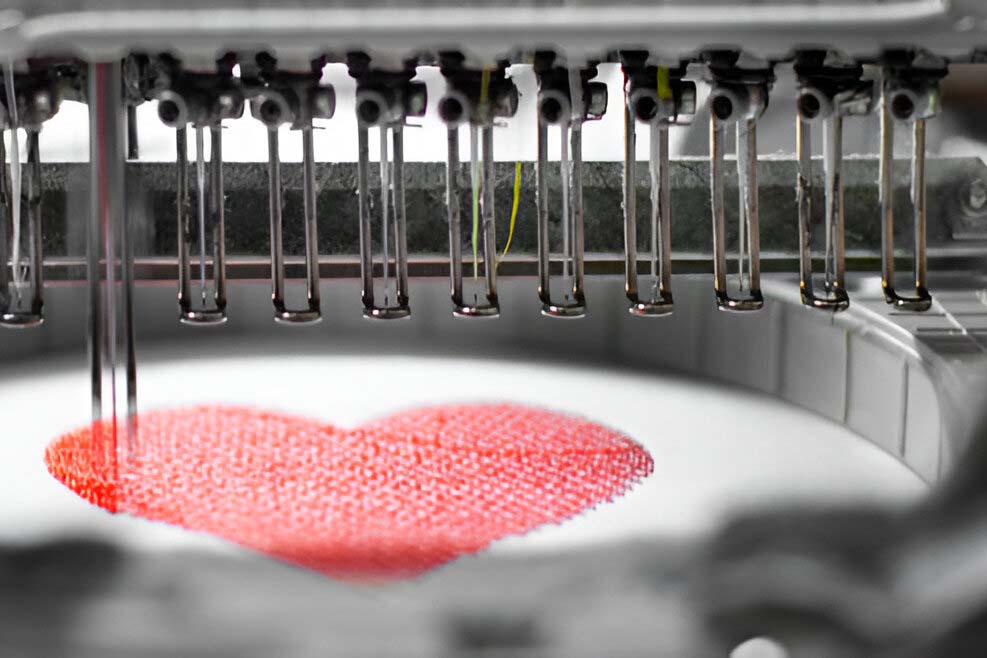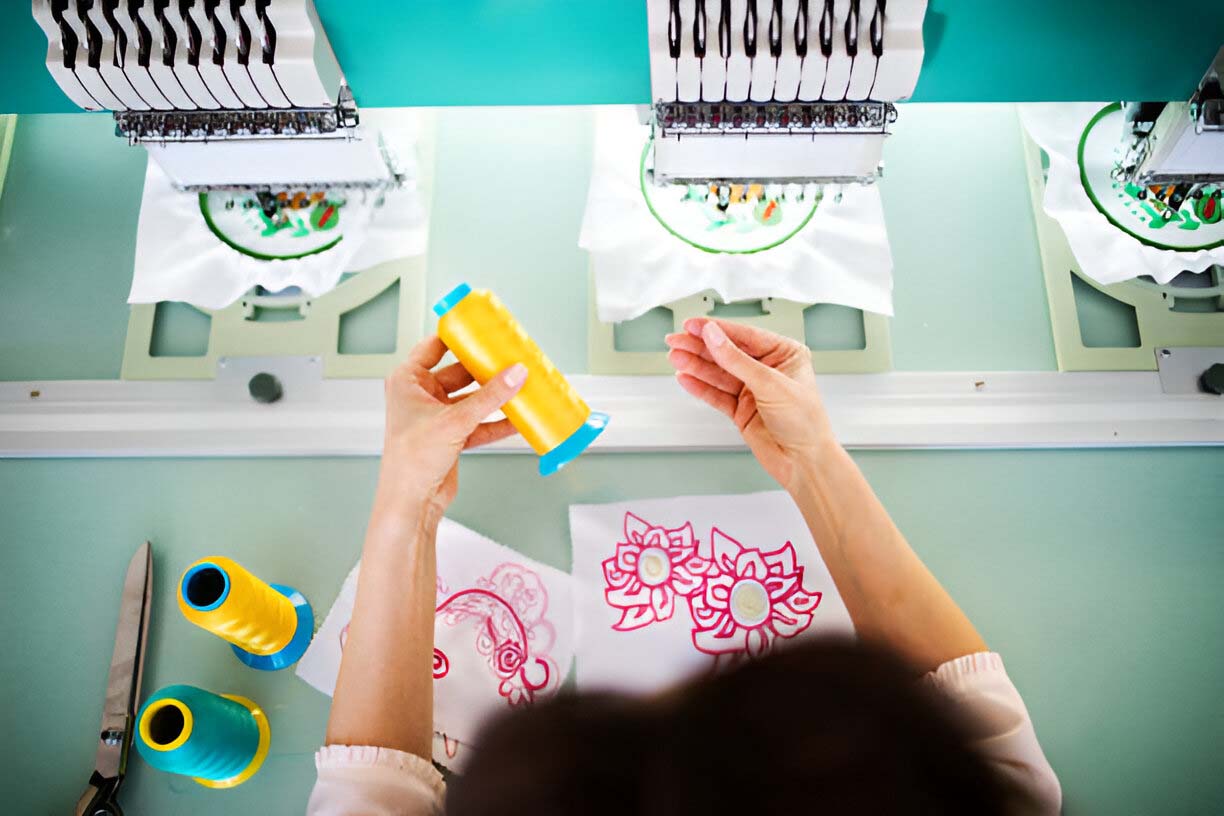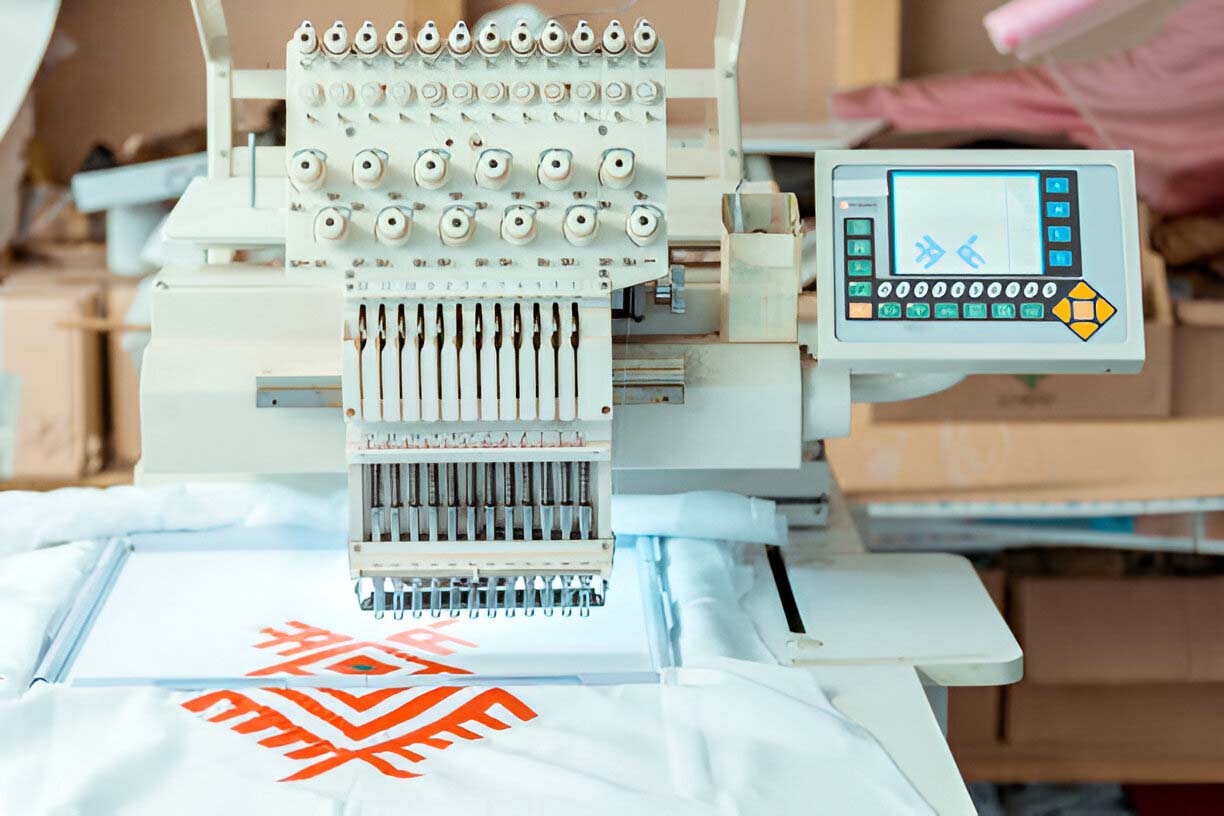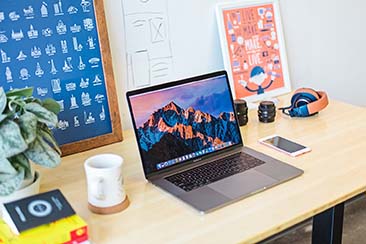Starting a home-based embroidery business can be an exciting and rewarding venture, offering a range of opportunities to tap into the custom apparel, gifts, and home decor markets. But, one of the most important decisions you’ll make when launching your embroidery business is choosing the right embroidery machine.
This equipment will impact the quality of your work, the speed of production, and, the profitability of your business. With so many options available, it can be overwhelming to find the right machine that fits your needs and budget. In this article, we’ll discuss the key factors to consider when selecting an embroidery machine for your home business.

1. Define Your Business Goals and Needs
Before diving into machine specs, it’s important to define your business goals. Consider what type of products you plan to create, as this will guide your decision-making process. Do you plan to specialize in custom t-shirts, hats, or bags? Or are you thinking of expanding to home decor items like pillows, towels, or table runners? Choosing the right embroidery machine for home business is crucial, as the types of products you intend to offer will affect the size, speed, and features needed in your machine.
For example, if you’re focusing on custom t-shirts, you’ll need a machine with a hoop size that can accommodate shirt fronts, backs, and sleeves. On the other hand, if you plan to offer intricate designs for small items like baby clothes or handkerchiefs, you may need a machine that can handle fine details with precision.
2. Hoop Size
The hoop size is one of the first things to consider when choosing an embroidery machine. The hoop is the frame that holds your fabric taut while the needle stitches the design. A larger hoop allows you to embroider bigger designs without needing to re-hoop the fabric. Common hoop sizes range from 4×4 inches to 14×14 inches, with larger machines offering even bigger options.
If your business requires frequent large designs (like logos or intricate patterns), you’ll enjoy a machine with a bigger hoop. Yet, if you plan to focus on smaller, detailed items like patches or monogramming, a standard 4×4 hoop could suffice. Keep in mind that larger hoops often come with a higher price tag, so balance the need for a larger hoop with your business goals and budget.
3. Needles and Thread Capacity
Another key consideration is the number of needles on the machine. A multi-needle embroidery machine allows you to work with thread colors at the same time, which can speed up your production process. A 6-needle or 10-needle machine, for example, enables you to complete a multi-colored design without stopping to change threads.
For businesses that plan to create more complex designs or those requiring thread colors (like logos), a multi-needle machine is invaluable. But, for simpler designs or businesses starting out, a single-needle machine may be enough, especially if you’re working with one color at a time.
4. Stitch Quality and Precision
The quality of stitches produced by your embroidery machine is paramount. A machine with poor stitch quality can lead to uneven or messy embroidery, which will negatively affect the professional image of your business. Look for a machine that delivers high-quality stitching with precision, ensuring clean and accurate designs on every item.
Some machines offer adjustable stitch length and tension settings, which can give you more control over the stitch quality. If you plan to work with delicate fabrics or intricate designs, it’s essential to choose a machine that can handle these challenges and produce crisp, professional results. Additionally, check if the machine has built-in stitch quality features, such as automatic thread tension adjustments, to ensure even stitching.
5. Ease of Use
An embroidery machine’s user interface plays a big role in your day-to-day operations. As a home business owner, you likely want to spend more time creating than figuring out how to use your machine. Look for a machine that is easy to set up, thread, and operate. Features like a touchscreen display, intuitive menus, and pre-programmed stitch designs can simplify the process, especially for beginners.
Some machines also come with automatic threading systems, which can save a lot of time and frustration. Automatic needle threading, automatic bobbin winding, and one-touch start buttons are features that can make your business run more smoothly.

6. Software and Design Options
If you plan to create your own custom designs, you’ll need embroidery software that can digitize your artwork into a format that your machine can read. Some embroidery machines come with their own software, while others are compatible with third-party software programs. Consider the cost, compatibility, and features of the software that comes with the machine. Look for programs that offer flexibility, design creation, and easy file transfers between the software and machine.
Also, check whether the machine comes with preloaded designs and fonts. Many home embroidery machines offer a library of built-in designs, which can be useful for small businesses starting out. However, for more complex or custom work, you may need to buy or create your own designs.
7. Machine Speed and Productivity
The speed at which your machine operates will affect your productivity. Embroidery machines are usually rated by their stitching speed, which is measured in stitches per minute (SPM). Commercial-grade machines stitch at faster speeds, allowing you to complete orders more quickly.
While a higher stitching speed is beneficial for large orders, keep in mind that very high speeds can affect stitch quality and cause more wear on the machine. For home businesses with smaller, custom orders, a machine that balances speed and quality may be ideal. A slower machine may not be a problem if you’re handling one-off projects or smaller batches.
8. Budget Considerations
Embroidery machines vary in price, ranging from a few hundred dollars to several thousand. When choosing a machine, it’s important to establish a budget and stick to it. High-end commercial-grade machines tend to have more advanced features like multi-needle systems, faster stitching speeds, and larger hoop sizes. While these machines can increase productivity, they come with a higher upfront cost.
For those just starting out or working with a limited budget, consider entry-level single-needle machines or mid-range multi-needle machines that offer good features without the hefty price tag. Keep in mind that while it’s tempting to buy the most expensive model, your business can still thrive with a more affordable machine that fits your specific needs.
9. Maintenance and Support
Like any investment, your embroidery machine will regular maintenance to keep it running smoothly. Machines with advanced features may need specialized maintenance, so it’s important to choose one that comes with a solid warranty and access to customer support services.
Ensure that the manufacturer offers good after-sales support, and check whether the machine comes with a user manual and online resources for troubleshooting. Some manufacturers also offer training videos or tutorials that can be helpful as you learn how to operate the machine and troubleshoot any issues that arise.
10. Brand Reputation
When making a significant investment in an embroidery machine, it’s wise to choose a reputable brand. Look for brands that are well-known in the embroidery industry for their reliability, customer support, and high-quality products. Some of the most trusted brands for home business embroidery machines include Brother, Bernina, Janome, and Pfaff.
Research user reviews and ask for recommendations from other business owners to ensure you’re choosing a brand that will stand the test of time and provide consistent, high-quality results.
Conclusion
Choosing the right embroidery machine for your home business requires careful consideration of your specific needs, budget, and production goals. Focus on the machine’s hoop size, needle capacity, stitch quality, ease of use, and speed to find the best option for your business. With the right machine, you can create high-quality products helping you grow your embroidery business into a successful, profitable venture.








